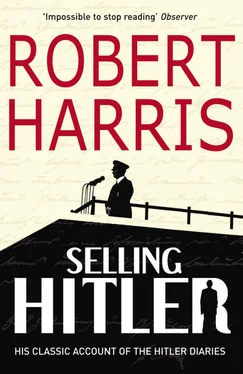Allied aircraft had been celebrating Adolf Hitler’s birthday all day with an almost continuous stream of air raids on Berlin. At 10 p.m. they struck again. Arndt and the other passengers heading in convoy for Schoenwalde were obliged to stop and seek shelter. The raid lasted four hours. At the airfield, Schultze and Gundlfinger were growing increasingly anxious. Time was running short. They had to take off under cover of darkness to avoid the Allied fighters which now had command of Germany’s skies during the day. The two pilots discussed tactics. Schultze favoured flying high to make use of every available scrap of cloud cover. Gundlfinger preferred hedgehopping at low altitude.
The passengers finally began struggling on to the airfield shortly before dawn. Arndt attended to the stowing of the trunks in Gundlfinger’s plane, then clambered in after them. He was one of sixteen passengers. Schultze took off first. Gundlfinger followed a few minutes later, at about 5 a.m. on the morning of 21 April. His destination lay 350 miles to the south: Ainring, near Salzburg, the airfield closest to Berchtesgaden.
In the event, Gundlfinger completed less than one-third of the journey. He had been in the air for little more than half an hour and had just passed what was left of the city of Dresden when something went wrong. Possibly the plane was shot up by a patrolling American fighter; possibly it was hit by fire from a German anti-aircraft battery which mistook it for an enemy plane. At any rate, it was next seen shortly before 6 a.m. skimming the treetops in flames before crashing into the Heidenholz forest close to the Czech border. Villagers from the nearby hamlet of Boernersdorf ran to the scene. The plane – a large Junkers 352 transport aircraft – had ploughed nose-first into the ground and was burning fiercely. Trapped in the wreckage, a figure writhed and screamed at the onlookers for help. But the intense heat and the ricochets of exploding ammunition made rescue impossible. The aircraft had to be left to burn itself out.
Schultze, meanwhile, had also run into trouble. Shortly after taking off he had discovered that one of his fuel pipes was fractured. He was forced to divert to Prague, then still in German hands, to refuel. It was 8.30 a.m. when he finally landed at Salzburg, expecting to find Gundlfinger waiting for him. All the other eight planes were there. But of the major and his aircraft there was no sign. This information was relayed to General Baur in Berlin and he, in turn, broke the news to Hitler that one of the planes involved in Operation Seraglio was missing. Hitler, he recalled, ‘became very pale’ and asked which one. Baur said it was the one with Arndt on board, at which Hitler appeared ‘very upset’. According to Baur, he then uttered the words which were to cause so much mischief almost forty years later. ‘In that plane,’ he exclaimed, ‘were all my private archives, that I had intended as a testament to posterity. It is a catastrophe!’
‘After I’d seen how much that affected the Führer,’ said Baur, ‘I tried to calm him and explain that Gundlfinger was an old fox from the First World War, that the Americans wouldn’t have got him that easily: probably he’d made an emergency landing somewhere. But we didn’t know, and our investigations were without success.’
On 22 April, the day after Arndt’s disappearance, with heavy fighting reported in the suburbs of Berlin and with no sign of the counter-attack he had ordered, Hitler at last admitted defeat. ‘That’s it,’ he shouted, scattering a handful of coloured pencils across the map table. ‘How am I supposed to direct the war in such circumstances? The war’s lost.’ He walked out of the military conference. At about 4 p.m. he summoned Julius Schaub, the crippled soldier who had been his secretary, bodyguard, companion, messenger boy and valet for more than twenty years. Together they opened the steel safe in Hitler’s bedroom. Four feet high and three feet wide, it was brimming with his personal papers. The material was stuffed into suitcases, carried up into the Chancellery garden, tipped into a bomb crater and set on fire. Hitler stood for a while in the fading light, watching as this record of his private affairs went up in smoke. ‘Richelieu once said, give me five lines one man has penned,’ Hitler is reported to have lamented subsequently. ‘What I have lost! My dearest memories! But what’s the point – sooner or later you’ve got to get rid of that stuff.’ To complete this task, he instructed Schaub to fly to Berchtesgaden and destroy all his remaining personal files.
Schaub is believed to have arrived at the Berghof on his errand of destruction on the night of 26 April. Berchtesgaden, which had been subjected to a 300-bomber raid the previous day, was in a chaotic state. The homes of Bormann and Goering had been badly damaged. One wing of the Berghof was wrecked. Schaub was in an equally dilapidated condition. Eva Braun’s sister, Gretl, who met him in the Führer’s apartments, was shocked to discover him drunk and on the arm of his mistress. He had flown down bearing Hitler’s keys but whether he actually carried out his master’s instruction and destroyed everything is unclear. According to a US intelligence report, Gretl confided to an American undercover agent a few months after the war that in her view ‘Schaub probably selected the most interesting things with the help of his mistress and hid them away.’ In the 1970s, the British historian David Irving, an indefatigable hunter of original documents, received information that Schaub had ‘sold Hitler’s papers to a former magistrate now living on Lake Starnberg in Bavaria’. The magistrate, however, ‘proved unapproachable’.
Before lurching off into the Führer’s private quarters with his girlfriend, Schaub handed Gretl a letter which had been entrusted to him in Berlin two days earlier by Eva Braun. ‘My darling little sister,’ it began
How it hurts me to write such lines to you. But there is nothing else to do. Each day and each hour may be our last, and so I must use this last opportunity to tell you what must be done… Please keep your head high and do not doubt. There is still hope. It goes without saying, however, that we will not let ourselves be captured alive.
In what was effectively her last will and testament, she provided a list of friends who were to receive her effects.
In addition I must request the following. Destroy all of my private correspondence, especially the business papers… Destroy also an envelope which is addressed to the Führer and is in the safe in the bunker. Please do not read it. The Führer’s letters and my answering letters (blue leather book) I would like packed watertight and if possible buried. Please do not destroy them….
In a reference to Gundlfinger’s plane and its cargo of Hitler’s property, Eva asked her sister if Arndt had arrived ‘with the letter and suitcase? We heard here only that the plane had been attacked.’ The letter ended ‘with heartiest greetings and a kiss’. A few days later, Eva Braun achieved her life’s ambition and married Adolf Hitler. On 30 April, the couple killed themselves and their bodies were set alight.
The following morning, at almost exactly the same moment as the charred corpses of the newly-weds were being interred in a shell hole in Berlin, their personal effects were being burned in Berchtesgaden. The rooms of the Berghof were systematically emptied of clothes, furniture, linen and crockery. The contents were taken outside and destroyed to prevent them falling into the hands of the approaching Americans. Hitler’s library of 2000 books, along with his collection of press cuttings, was hidden in a nearby salt mine. (These volumes, each with a garish swastika bookplate bearing the inscription ‘ Ex Libris Adolf Hitler ’, were later found by American troops, transported to Washington, and in 1953 catalogued as a collection by the Library of Congress.)
Читать дальше












